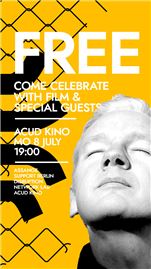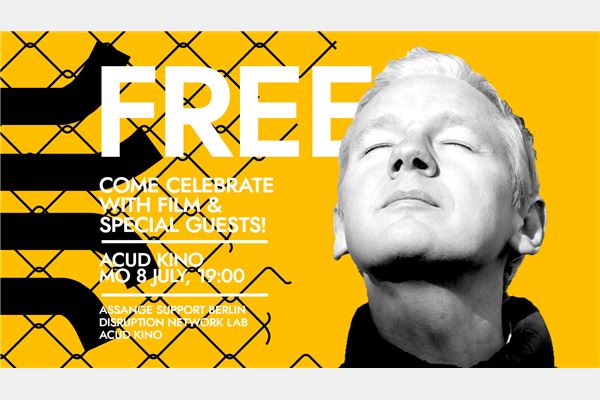HACKING JUSTICE - Film Screening | LEAKS FOR FUTURE - Talk

Infos
150 min
WikiLeaks founder Julian Assange is free.
He was forced to plead guilty to avoid being in prison for life, and for charges he should never have received for carrying out a journalistic act. If WikiLeaks founder Julian Assange had been extradited to the US, he would have faced a sentence of up to 175 years in prison for publishing US war crimes, including torture, murder and other human rights violations.

© Disruption Network Lab e.V.
In the case against Julian Assange, having used the Espionage Act for obtaining and publishing confidential documents from Chelsea Manning in 2010 is a condemnation against freedom of the press and information. The trial of Julian Assange has set a precedent for the use of the Espionage Act against journalists and publishers. This is an unprecedented attack on press freedom and "anyone who publishes facts about state crimes of the highest order", as the UN Special Rapporteur on Torture, Alice Jill Edwards, has stated.
The right to obtain and publish information received from a source should be protected. In fact, the Espionage Act in this case contradicts the First Amendment of the US Constitution, which is supposed to guarantee freedom of speech and freedom of the press. Julian Assange's freedom is certainly a victory, but there are still battles to be fought to prevent such cases from happening again and the Espionage Act from being used to target journalists and whistleblowers.
On the night of July 8, which should have been the day before Julian Assange's appeal against extradition from the UK to the US we will celebrate the freedom of Julian Assange and connect the fight for freedom of information through the work of Assange and WikiLeaks with the fight for climate justice.
In addition to other important revelations, WikiLeaks has published many important documents for the environmental and climate movement (https://wikileaks.org/COP-26.html#fn:1). WikiLeaks is cited in more than 28 thousand academic papers and US court documents, which shows why WikiLeaks’ publications and its criminalisation as a whole are important for social movements: https://wikileaks.org/What-is-WikiLeaks.html.
Big corporations suppress coverage of their scandals with expensive lawsuits. A glaring example of the suppression of reporting by large corporations is the chemical waste scandal involving the oil company Trafigura: the company spread highly toxic chemical waste over a large area in Africa instead of disposing of it safely, which would have been more expensive. The chemical waste had devastating effects on people and the environment. The BBC had reported on the scandal but removed all reports from its website after a lawsuit by the corporation, as the legal battle could have cost £3 million.
Wikileaks has uploaded summaries of the case and the documents from the corporation's lawsuit against the BBC to WikiLeaks, where they can still be read.
On 8 July from 7pm, we will be discussing this connection with Esteban Servat, climate activist and founder of EcoLeaks (a project inspired by WikiLeaks), following the screening of the documentary on the Assange case by director Clara López Rubio, who will be present for the talk. Janine, privacy researcher, investigative journalist and educator, will update about the current situation of Julian Assange. Tatiana Bazzichelli, Founder & Artistic Director of the Disruption Network Lab e.V., will moderate the discussion. The event is introduced by Raja Stutz & Claudia Daseking (Assange Support Berlin).
Join us to celebrate the freedom of Julian Assange and keep up the fight for freedom of the press and information!
19:00-20:30: HACKING JUSTICE (Film Screening)
Directed by Clara López Rubio, Juan Pancorbo (Spain, Germany, 2017/2021, 1h 29m, Language: English, OmU).
With a unique and independent access to a worldwide campaign and to the Ecuadorian embassy where WikiLeaks founder Julian Assange found his refuge, the film witnesses the struggle for the control of information, the growing influence of intelligence services, the role of the mass media, and the difficult balance of individual rights and state security.
For his lawyer, Baltasar Garzón, much more is at stake than the freedom of an independent journalist and publisher. As head of Assange’s legal team, Garzón warns that the growing influence of intelligence services puts freedom of information, our right to know what our governments are doing, and democracy at risk.
Since he took on the case in 2012, defending Julian Assange has put judge Baltasar Garzón’s talent and ability to the test. They’ve won a few battles, but nobody knows how the war will end.
More info: https://filmhaus-koeln.de/film/hacking-justice
20:30-21:30: LEAKS FOR FUTURE (Talk)
In 2018 the Argentinian climate activist and biologist Esteban Servat went head-to-head with his government and the world’s most powerful energy companies.
The biologist had worked in the biotech industry for ten years before returning to Argentina to set up an eco-community in the Mendoza region. The project developed excellently until the exploitation of fracking for oil and gas in the Vaca Muerta field expanded to his province of Mendoza, spearheaded by major US and European multinational fossil fuel corporations. Today, Argentina’s Vaca Muerta comprises the second-largest known reserve of shale gas and the fourth-largest reserve of shale oil in the world. Esteban decided to fight against this environmental catastrophe and destruction of the region, launching an anti-fracking protest that has mobilised tens of thousands of people in Argentina.
Servat published a secret Argentine government study on the environmental impact of fracking in the mountainous region of Mendoza, a report provided to him by a whistleblower within the government of President Mauricio Macri. The study revealed that the Macri administration knew that fracking was contaminating aquifers, but lied to the public about the extent of the risk. Massive repression by the Argentine government forced Servat to leave the country in 2018.
After the screening of the film Hacking Justice, we will discuss the work of EcoLeaks and why disclosures such as those made by WikiLeaks are relevant to the environmental movement.
Speakers
Clara López Rubio (Film Director, ES/DE)
Clara López Rubio is a Spanish film director. Her documentaries “In der Falle: Julian Assange zwischen Politik und Justiz” (2017) and “Hacking Justice” (“Der Fall Assange: eine Chronik”, 2021) have been broadcasted on several European televisions and participated in Film Festivals around the world. Clara López is also a cinema historian. Among her publications is the book “Dreams of aviation and Spanish Earth”, about the cinema based on the Spanish Civil War.
Esteban Servat (Climate Activist, Founder, EcoLeaks, AR/DE)
Esteban is a scientists and exiled environmental activist from Argentina. He founded EcoLeaks and published a secret government document revealing contamination of water tables by the first pilot wells of fracking in Mendoza province, part of the Vaca Muerta shale play. This led to building a massive anti-fracking movement and to intense government persecution and death threats that lead him to move to Germany 5 years ago. From Europe, he has been mobilizing grassroots groups and bringing together movements internationally, building the Global South-North grassroots movements such as "Shale Must Fall" and "Debt for Climate".
Janine
Privacy Researcher, Investigative Journalist and Educator
Janine is a privacy researcher, independent investigative journalist, and educator on the topics of informational self-determination and (counter)surveillance. During 2023, she was part of the Human Rights Foundation’s CBDC Tracker fellowship, exploring worldwide implementations of central bank digital currency and their potential for financial surveillance & control. For more than a decade, she has been closely following the extradition case(s) against Julian Assange.
Tatiana Bazzichelli (Artistic Director, Disruption Network Lab IT/DE)
Tatiana Bazzichelli is the founder and director of the Disruption Network Lab (https://www.disruptionlab.org). Her work focuses on whistleblowing, network culture, art and hacktivism. She is the author of Whistleblowing for Change (2021), Networked Disruption (2013), Disrupting Business (2013) and Networking (2006). In 2011-2014 she was programme curator at the transmediale festival in Berlin. She received a Ph.D. in Information and Media Studies from the Faculty of Arts, Aarhus University, Denmark in 2011.
This event is a cooperation between Assange Support Berlin & the director Clara López, ACUDkino and Disruption Network Lab. The event is part of the series Kino free Assange by Assange Support Berlin and the community programme by Disruption Network Lab. (Disruption Network Lab’s community programme is part of The New Perspectives for Action – A project by Re-Imagine Europe, co-founded by the European Union).